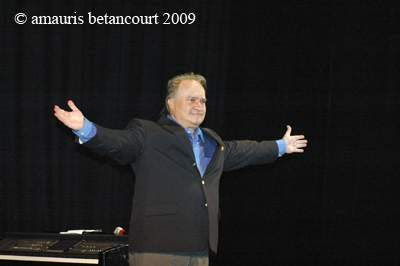 Pianist Frank Fernández sticks out among the most genuine representatives of the musical art in Cuba. Born in the municipality of Mayarí, he will turn 65 next March, out of which 50 have been linked to music.
Pianist Frank Fernández sticks out among the most genuine representatives of the musical art in Cuba. Born in the municipality of Mayarí, he will turn 65 next March, out of which 50 have been linked to music.Frank, citing an interview granted to the young journalist Leandro Estupiñán for the weekly Ahora! “…I am convinced there’s nothing that can be done about the past and the future does not exist. The only important thing is the now.” It happened so during the concert at the Ismaelillo movie-theater in Holguín last January 31, as a way to start celebrations for this half a century dedicated to the study and interpretation of the piano.
People from Holguín could enjoy his interpretations of Schubert's Ave María; and The Waltz of the Minute, Sad Waltz, from Federico Chopin; A Memory, Invitation, Pecking, Bye to Cuba, and Three Blows from Ignacio Cervantes. And some others like the soundtracks from the TV series The Great Rebellion and the soap-opera Brave Farm, as well as Joropo Waltz, Noon Conga, Habanera and Zapateo. He played besides, to please the public's loud and insistent ovations, Sea Pearl, from Sindo Garay; The Comparse and Malagueña, from Ernesto Lecuona; Ritual Dance of the Fire, from Manuel de Falla and the musicalized poem Thanks to Life, from Chilean Violeta Parra.
 He thanks very much Altagracia Tamayo, mother and piano teacher, his first studies of piano in his natal town, where there was a rich cultural environment linked to art's prestigious Cuban personalities like Sindo Garay, a brilliant musician, one of whose relatives became his godfather.
He thanks very much Altagracia Tamayo, mother and piano teacher, his first studies of piano in his natal town, where there was a rich cultural environment linked to art's prestigious Cuban personalities like Sindo Garay, a brilliant musician, one of whose relatives became his godfather.His mother taught him, when he was three or four years old, the classical piano with works from Beethoven, Schumann, Litzt, Mozart, and Schubert. At the same time, he listened to the Cuban folk music in Sindo Garay's names and Manuel Corona, personally. He also heard from Pepe Sánchez, María Teresa Vera, Miguel Matamoros. And so he mixed vernacular music with the classical and universal that so much defines his present-day artistic duty.
He is acknowledged at present as one of the predecessors of the Cuban contemporary school of piano. Despite having studied at the former Soviet Union and fed his culture with influences of recognized figures ebbing into this prestigious worldwide piano headquarters – in addition to the renowned creative historical background from the nearby European school – he gives Cuban musicians a distinguished place from whom he benefited in piano playing and composition.
 His brilliant interpretations have won over the compliments from the public and the press in Cuba and abroad, and at the piano's mecca: The Moscow Tchaikostky conservatory. Thus he has toured the most important piano concert halls in the world from Tokyo to Paris and Madrid where he has been awarded worldwide recognitions as pianist and composer.
His brilliant interpretations have won over the compliments from the public and the press in Cuba and abroad, and at the piano's mecca: The Moscow Tchaikostky conservatory. Thus he has toured the most important piano concert halls in the world from Tokyo to Paris and Madrid where he has been awarded worldwide recognitions as pianist and composer. Frank Fernández is a living personality in the history of the Cuban music. Such a credit does not keep him from devoting himself to producing and rescuing the forgotten musical stars from the Island because “independently that we agree or not with a way of thinking” – he tells Leandro. “Art has no boundaries, artists do.”
Frank Fernández is a living personality in the history of the Cuban music. Such a credit does not keep him from devoting himself to producing and rescuing the forgotten musical stars from the Island because “independently that we agree or not with a way of thinking” – he tells Leandro. “Art has no boundaries, artists do.”Frank pleases himself too motivating young people’s accomplishments and promoting his natal province’s culture. He attended last year the interpretation of the 1812 symphony: He praised at that time the Symphony Orchestra of Holguín and now he has come back to perform in an artistic homage to the Cuban Eastern Army.
 Frank Fernández will enjoy an intense year, among homages and recognitions, in his 50 years doing art. Holguín can hardly hide the proud that Frank has been born here and has started his celebration precisely at his birthplace province.
Frank Fernández will enjoy an intense year, among homages and recognitions, in his 50 years doing art. Holguín can hardly hide the proud that Frank has been born here and has started his celebration precisely at his birthplace province.

What a great resource!
ResponderBorrar